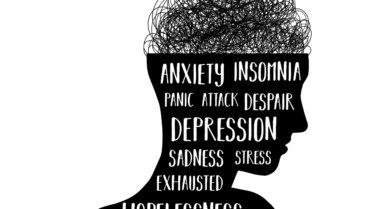Life can be wonderful and exciting, but let’s face it – sometimes it’s just plain tough. Whether it’s work stress, family responsibilities, financial pressures or relationship struggles – there are times when we all feel like we’re barely holding on.
But what if I told you that you could trade those feelings of overwhelm for a sense of serenity? It may seem impossible right now, but with the right tools in your mental health toolkit, you can navigate even the toughest challenges and emerge feeling calm, centered and empowered. In this blog post, we’ll explore some tried-and-true strategies for managing stress and finding peace amidst life’s chaos. So take a deep breath and get ready to transform from stressed out to serene!
Understanding Stress and Its Causes
Most of us have heard of the “fight or flight” response. This is the body’s emergency stress response that gets activated when we perceive a threat. Once activated, the body releases stress hormones like cortisol and adrenaline. These hormones prepare the body for action by increasing heart rate, blood pressure, and respiration. They also boost energy by releasing glucose into the bloodstream.
While this stress response can be lifesaving in a true emergency, it was not meant to be constantly turned on. Unfortunately, many of us live in a state of chronic stress, with our fight or flight response perpetually activated. This can lead to serious health problems like anxiety, depression, cardiovascular disease, and sleeplessness.
So what causes chronic stress? There are many possible causes, including work stress, financial stress, family stress, and even exposure to traumatic events. But one of the most common causes of chronic stress is simply having too much on our plates. We try to do too much and be everything to everyone, leaving little time for rest and relaxation. This can lead to feeling overwhelmed, which only aggravates the problem.
If you’re struggling with chronic stress, it’s important to understand its causes so you can take steps to better manage it. Identifying your personal Stress Triggers can be a helpful first step. Once you know what sets off your fight or flight response, you can begin to develop coping mechanisms for dealing with those triggers in a more constructive way.
How to Identify Stress and Tension in Your Body
Most of us know what it feels like to be stressed. We may feel anxious, irritable, or on edge. Our heart may race, and we may have trouble sleeping or concentrating. But did you know that stress can also contribute to physical symptoms like headaches, gastrointestinal problems, and muscle tension?
If you’re feeling overwhelmed by stress, it’s important to take some time to relax and de-stress. One way to do this is to pay attention to your body. How do you feel when you’re stressed? Do you have any physical symptoms?
Identifying the physical signs of stress can help you take steps to reduce its impact on your life. Here are some common physical signs of stress:
Headaches: Stress can cause tension headaches, which are characterized by pain or pressure in the temples or forehead. If you often get headaches, pay attention to other symptoms you’re experiencing. Are they worse when you’re under a lot of stress? If so, managing your stress may help ease your headache pain.
Muscle tension: Stress can lead to tightness in the muscles, especially in the neck and shoulders. This muscle tension can cause pain and stiffness. Pay attention to whether you tend to feel more tense when you’re under pressure at work or at home. Taking breaks throughout the day to stretch or do some relaxation exercises can help ease muscle tension and reduce stress levels overall.
Gastrointestinal problems: Stress can worsen gastrointestinal problems like heart burn, constipation, and diarrhea. If you suddenly start experiencing digestive issues that weren’t there before, consider if stress may be a factor.
Rapid breathing: Anxiety and stress can lead to rapid breathing, known as hyperventilation. Hyperventilation can cause dizziness, chest pain, and difficulty catching your breath. Slow breathing exercises can help bring oxygen back into balance in the body and reduce stress levels quickly.
Sweating: Stress can also cause sweating or clamminess in some people. Pay attention to whether you tend to sweat more when you’re feeling overwhelmed or anxious.
If you recognize any of these physical signs of stress, take some time to manage your thoughts and emotions as well as focus on relaxation techniques that work for you like deep breathing, yoga, and exercise.
The Benefits of Managing Stress
When it comes to stress, we often think of it as something negative that we want to avoid. But the truth is, stress can actually be beneficial for us if we know how to manage it properly. By managing our stress levels, we can improve our mental and physical well-being, boost our immune system, and even increase our lifespan.
Here are some of the benefits of managing stress:
- Improves mental well-being: Stress can take a toll on our mental health, causing anxiety, depression, and other mental health disorders. However, by managing our stress levels, we can improve our mental well-being.
- Boosts immune system: Stress can weaken our immune system, making us more susceptible to illnesses and diseases. However, by managing our stress levels, we can boost our immune system and stay healthy.
- Increases lifespan: Studies have shown that people who manage their stress levels tend to live longer than those who don’t. This is likely because managed stress leads to improved mental and physical well-being, which in turn leads to a healthier lifestyle overall.
Ways to Manage Stress: Mindful Breathing, Exercise, Meditation and Relaxation Techniques
When it comes to managing stress, there are a variety of different techniques that can be effective. One of the most basic and essential ways to manage stress is through mindful breathing. Taking slow,deep breaths can help to calm and center yourself when you’re feeling stressed. Exercise is another great way to work off excess energy and tension that can build up during times of stress.Whether it’s a quick walk around the block or a more strenuous workout at the gym, exercise can help to relieve stress. Meditation can also be helpful for managing stress. Taking time to sit quietly and focus on your breath can help to quiet your mind and provide some much-needed peace and relaxation. There are also a number of relaxation techniques that can be helpful for managing stress. Things like yoga, Tai Chi, and even simply spending time in nature can help you to relax your body and mind and find some relief from stress.
Nutrition and Supplements for Stress Relief
When it comes to stress relief, nutrition and supplements play an important role. There are a few key nutrients and supplements that can help to alleviate stress and promote relaxation.
One of the most important nutrients for stress relief is magnesium. Magnesium helps to relax the nervous system and has been shown to be effective in reducing symptoms of anxiety and depression. It can be found in dark leafy greens, nuts, seeds, and whole grains. You can also take a magnesium supplement if you feel you are not getting enough from your diet.
Another nutrient that is important for stress relief is omega-3 fatty acids. These healthy fats help to reduce inflammation throughout the body and have been shown to be helpful in reducing anxiety and depression. Omega-3 fatty acids can be found in fish, flaxseeds, and chia seeds. You can also take an omega-3 supplement if you feel you are not getting enough from your diet.
In addition to these nutrients, there are also a few supplements that can be helpful in relieving stress. One of these is ashwagandha, an herb that has been used for centuries in Ayurvedic medicine to help reduce anxiety and promote relaxation. Ashwagandha supplements can be found online or at health food stores.
Another supplement that can be helpful for stress relief is probiotics. Probiotics are live bacteria that help to maintain a healthy gut flora. This helps to reduce inflammation throughout the body and can help to relieve stress. Probiotics can be found in fermented foods such as yogurt or kombucha. You can also take a probiotic supplement if you feel your diet is not providing enough probiotic benefits.
Finally, there are several herbs that have been used for centuries to help promote relaxation and reduce anxiety. These include chamomile, lavender, lemon balm, passionflower, and valerian root. Most of these herbs can be found in teas or supplements online or at health food stores.
Sleep Hygiene Strategies to Reduce Stress Levels
We all know how important a good night’s sleep is for our overall health, but when we’re under stress, it can be hard to get the rest we need. Luckily, there are some things we can do to improve our sleep hygiene and reduce stress levels.
Here are a few sleep hygiene strategies to try:
- Establish a nightly routine.
When we have a set routine before bed, our bodies know it’s time to wind down and prepare for sleep. This can be something as simple as taking a warm bath or reading for 20 minutes before turning out the light.
- Create a soothing environment.
Make sure your bedroom is dark, cool, and comfortable. Eliminate any noise or distractions that could keep you from falling asleep. And avoid using electronics in bed—the blue light from screens can interfere with your body’s natural sleep-wake cycle.
- limit caffeine intake.
Caffeine is a stimulant, so it’s best to avoid it in the afternoon and evening if you want to get a good night’s sleep. If you do need caffeine to get through the day, limit yourself to one cup of coffee or tea in the morning.
- Avoid alcohol before bedtime.
While a nightcap may help you fall asleep initially, alcohol disrupts deep sleep later in the night, so you’re likely to wake up feeling more tired and stressed.
- Exercise regularly.
Regular exercise can help decrease stress levels and improve sleep quality, so try to fit in at least 30 minutes of physical activity a day. Just make sure you’re done exercising at least two hours before bedtime.
By following these sleep hygiene strategies, you can get the restful sleep your body needs to reduce stress levels and improve your overall wellbeing.
Tips to Develop a Healthy Routine & Mental Outlet
When life gets tough, it can be hard to keep up with a healthy routine. It is important to find a balance between taking care of yourself and your responsibilities. Here are some tips to help you develop a healthy routine and mental outlet:
- Set realistic goals for yourself. Don’t try to do too much at once. Break your goals down into manageable pieces so you don’t get overwhelmed.
- Make time for things that make you happy. If you don’t have time for hobbies or activities that you enjoy, make time for them. It is important to do things that make you feel good in order to reduce stress levels.
- Get enough sleep. Sleep is crucial for both physical and mental health. Make sure to get enough rest so you can function at your best during the day.
- Eat healthy foods and exercise regularly. Taking care of your body will help take care of your mind as well. Eating nutritious foods and getting regular exercise will help improve your overall health and well-being.
- Take breaks when needed, but don’t veg out all day long. Sometimes it’s necessary to take a break from work or other obligations, but spending all day on the couch watching TV is not going to help reduce stress levels or promote a healthy lifestyle .
- Find a mental outlet. Taking up a creative activity such as drawing, painting, writing, or even playing an instrument can help to reduce stress levels and boost healthy brain activity.
- Stay connected to friends and family. Reaching out to those you care about when feeling down can be very helpful in promoting positive mental health outcomes. Connecting with others also helps remind us that we are not alone in our struggles.
Conclusion
Learning to manage stress is an invaluable skill, as stressful times in life can have serious consequences on our well-being. While it may take some practice and dedication, cultivating strategies for dealing with stress effectively can help us better handle difficult moments when they arrive. Remember that sometimes taking a moment for yourself and centering yourself is one of the best things you can do – even if just for five minutes! With the right tools, we all have the potential to transform stress into serenity in any situation.





Add Comment